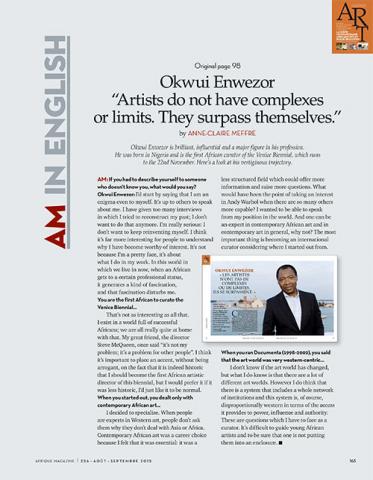“Artists do not have complexes or limits. They surpass themselves.”

Okwui Enwezor is brilliant, influential and a major figure in his profession. He was born in Nigeria and is the first African curator of the Venice Biennial, which runs to the 22nd November. Here’s a look at his vertiginous trajectory.
AM: If you had to describe yourself to someone who doesn’t know you, what would you say?
Okwui Enwezor: I’d start by saying that I am an enigma even to myself. It’s up to others to speak about me. I have given too many interviews in which I tried to reconstruct my past; I don’t want to do that anymore. I’m really serious: I don’t want to keep reinventing myself. I think it’s far more interesting for people to understand why I have become worthy of interest. It’s not because I’m a pretty face, it’s about what I do in my work. In this world in which we live in now, when an African gets to a certain professional status, it generates a kind of fascination, and that fascination disturbs me.
You are the first African to curate the Venice Biennial...
That’s not as interesting as all that. I exist in a world full of successful Africans; we are all really quite at home with that. My great friend, the director Steve McQueen, once said “it’s not my problem; it’s a problem for other people”. I think it’s important to place an accent, without being arrogant, on the fact that it is indeed historic that I should become the first African artistic director of this biennial, but I would prefer it if it was less historic, I’d just like it to be normal.
When you started out, you dealt only with contemporary African art...
I decided to specialise. When people are experts in Western art, people don’t ask them why they don’t deal with Asia or Africa. Contemporary African art was a career choice because I felt that it was essential: it was a less structured field which could offer more information and raise more questions. What would have been the point of taking an interest in Andy Warhol when there are so many others more capable? I wanted to be able to speak from my position in the world. And one can be an expert in contemporary African art and in contemporary art in general, why not? The most important thing is becoming an international curator considering where I started out from.
When you ran Documenta (1998-2002), you said that the art world was very western-centric...
I don’t know if the art world has changed, but what I do know is that there are a lot of different art worlds. However I do think that there is a system that includes a whole network of institutions and this system is, of course, disproportionally western in terms of the access it provides to power, inf luence and authority. These are questions which I have to face as a curator. It’s difficult to guide young African artists and to be sure that one is not putting them into an enclosure.